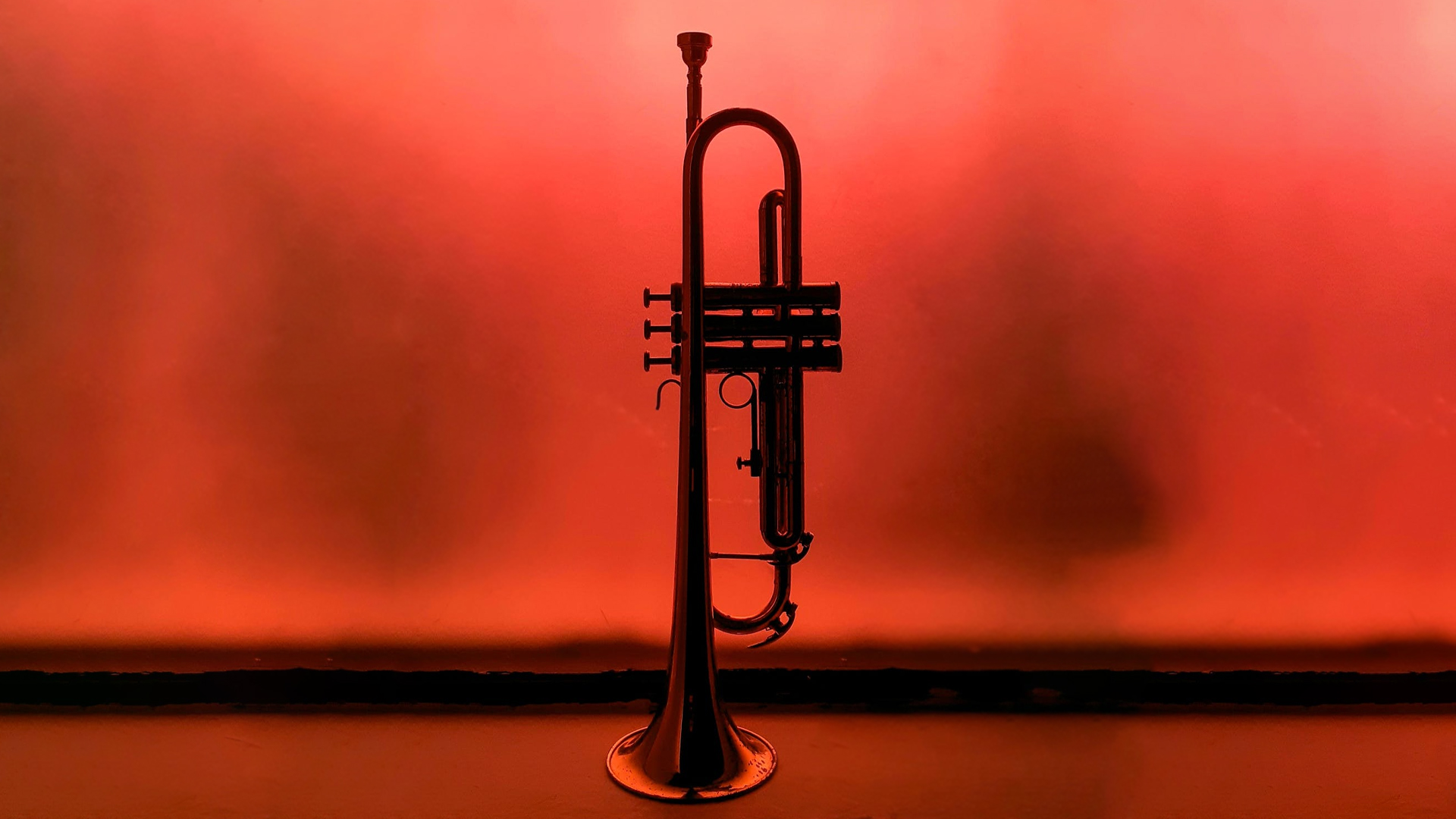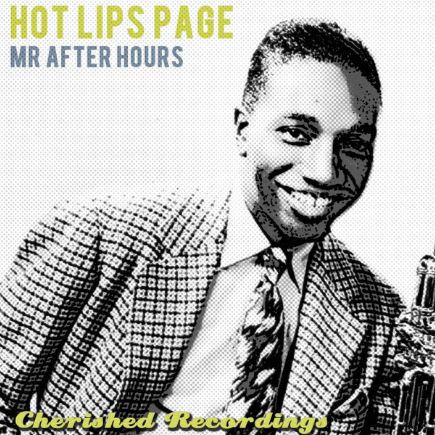Hot Lips Page, la flamboyance du swing texan
Né à Dallas, Oran Thaddeus ‘Hot Lips’ Page fut l’un de ces musiciens-ponts qui relient le blues rural du Sud profond à l’essor urbain du swing. Trompettiste à la sonorité flamboyante, chanteur expressif et véritable homme de scène, il marqua durablement la scène texane avant de s’imposer à New York dans les années 1930. Son jeu, à la fois énergique et nuancé, marie la rudesse du blues à la clarté rythmique du jazz orchestré, plaçant Page au carrefour des héritages de Louis Armstrong et des innovations à venir du bebop.
Formé dans les fanfares et les clubs de Fort Worth, Hot Lips Page forge très tôt un style puissant, nourri de la rue et des bals populaires. Au cours des années 1920, il se produit avec le pianiste Troy Floyd et accompagne sur scène des figures emblématiques du blues telles que Ma Rainey, Bessie Smith et Ida Cox. Cette expérience lui offre une compréhension intime du lien entre chant et instrument, que l’on retrouve dans sa trompette chantante, d’une intensité presque vocale.
Repéré par Bennie Moten, le chef de file du Kansas City jazz, Hot Lips Page rejoint son orchestre en 1931. Il y côtoie des musiciens d’exception — Count Basie, Lester Young, Ben Webster — et s’impose rapidement par son timbre chaleureux et sa capacité à porter le swing à incandescence. Après la disparition de Moten, il reste étroitement associé à Basie, participant à la formation du futur Count Basie Orchestra. Mais son tempérament de showman et son indépendance artistique le poussent à tracer sa propre voie.
En 1937, installé à New York, il fonde son propre groupe tout en collaborant avec Artie Shaw, Billie Holiday, Pete Johnson ou Meade Lux Lewis. Ses enregistrements de Skippy, Good Old Bosom Bread ou The Lady in Bed révèlent un souffle fougueux et une imagination rythmique qui feront école. Son approche nerveuse de la trompette, son phrasé incisif et son jeu dans le registre aigu annoncent déjà certaines audaces du bebop.
Entre 1943 et 1949, Hot Lips Page devient une figure familière des clubs new-yorkais — Apollo Theater, Onyx Club, Famous Door, ou encore le club d’Eddie Condon — où il se produit avec Ethel Waters et d’autres grandes voix du jazz. En 1949, il participe au Festival de jazz de Paris, puis effectue plusieurs tournées européennes, notamment en Scandinavie et aux Pays-Bas. Ces voyages renforcent sa réputation de musicien complet, capable de séduire aussi bien les amateurs de blues que les puristes du swing.
Jusqu’à sa mort prématurée en 1954, Hot Lips Page multiplie les enregistrements pour Decca, Vocalion et Bluebird. Sa discographie, riche et inégale, témoigne d’une vitalité constante et d’un attachement profond à l’esprit du jazz.
Hot Lips Page, el fulgor del swing tejano
Nacido en Dallas, Oran Thaddeus ‘Hot Lips’ Page fue uno de esos músicos puente que unen el blues rural del profundo sur con el auge urbano del swing. Trompetista de sonoridad ardiente, cantante expresivo y auténtico hombre de escena, dejó una huella duradera en el panorama musical tejano antes de imponerse en Nueva York durante los años treinta. Su estilo, a la vez enérgico y matizado, combina la rudeza del blues con la claridad rítmica del jazz orquestado, situando a Page en el cruce entre la herencia de Louis Armstrong y las innovaciones del bebop.
Formado en las bandas y clubes de Fort Worth, Hot Lips Page forjó desde temprano un sonido poderoso, impregnado de la energía de las calles y de los bailes populares. Durante los años veinte actuó con el pianista Troy Floyd y acompañó en el escenario a figuras emblemáticas del blues como Ma Rainey, Bessie Smith e Ida Cox. Esta experiencia le dio una comprensión íntima del vínculo entre el canto y el instrumento, reflejada en su trompeta de timbre vocal y expresividad emocional.
Descubierto por Bennie Moten, líder del Kansas City jazz, Hot Lips Page se unió a su orquesta en 1931. Allí compartió escenario con músicos excepcionales —Count Basie, Lester Young, Ben Webster— y se destacó rápidamente por su tono cálido y su capacidad para llevar el swing al paroxismo. Tras la muerte de Moten, siguió estrechamente ligado a Basie, participando en la formación del futuro Count Basie Orchestra. Sin embargo, su espíritu de showman y su independencia artística lo impulsaron a abrir su propio camino.
En 1937, ya establecido en Nueva York, fundó su propio grupo y colaboró con Artie Shaw, Billie Holiday, Pete Johnson y Meade Lux Lewis. Sus grabaciones de Skippy, Good Old Bosom Bread y The Lady in Bed revelan un ímpetu apasionado y una imaginación rítmica que influirían en toda una generación. Su enfoque nervioso de la trompeta, su fraseo incisivo y su dominio del registro agudo anticipan las audacias del bebop.
Entre 1943 y 1949, Hot Lips Page se convirtió en una presencia habitual en los clubes neoyorquinos —Apollo Theater, Onyx Club, Famous Door y el club de Eddie Condon— donde actuó junto a Ethel Waters y otras grandes voces del jazz. En 1949 participó en el Festival de Jazz de París y realizó varias giras europeas, especialmente por Escandinavia y los Países Bajos. Estos viajes consolidaron su reputación como músico completo, capaz de cautivar tanto a los amantes del blues como a los puristas del swing.
Hasta su prematura muerte en 1954, Hot Lips Page multiplicó las grabaciones para Decca, Vocalion y Bluebird. Su discografía, tan variada como intensa, refleja una vitalidad inagotable y un compromiso profundo con el espíritu del jazz.
Hot Lips Page, il fuoco del swing texano
Nato a Dallas, Oran Thaddeus ‘Hot Lips’ Page fu uno di quei musicisti ponte che collegano il blues rurale del profondo Sud all’ascesa urbana dello swing. Trombettista dal suono ardente, cantante espressivo e autentico uomo di spettacolo, lasciò un’impronta duratura sulla scena texana prima di affermarsi a New York negli anni Trenta. Il suo stile, insieme energico e raffinato, unisce la rudezza del blues alla chiarezza ritmica del jazz orchestrale, collocando Page all’incrocio tra l’eredità di Louis Armstrong e le innovazioni del bebop.
Formatosi nelle bande e nei club di Fort Worth, Hot Lips Page sviluppò presto uno stile potente, intriso dell’energia delle strade e dei balli popolari. Negli anni Venti suonò con il pianista Troy Floyd e accompagnò sul palco grandi figure del blues come Ma Rainey, Bessie Smith e Ida Cox. Questa esperienza gli offrì una comprensione profonda del legame tra voce e strumento, evidente nella sua tromba dal timbro quasi vocale e dall’intensità emozionale.
Scoperto da Bennie Moten, leader del Kansas City jazz, Hot Lips Page entrò nella sua orchestra nel 1931. Vi suonò accanto a musicisti straordinari —Count Basie, Lester Young, Ben Webster— distinguendosi per il suo tono caldo e la capacità di portare il swing a un livello di incandescenza. Dopo la morte di Moten, rimase vicino a Basie, contribuendo alla formazione del futuro Count Basie Orchestra. Tuttavia, il suo spirito indipendente e la sua indole da showman lo spinsero presto verso un percorso personale.
Nel 1937, trasferitosi a New York, fondò il proprio gruppo collaborando con Artie Shaw, Billie Holiday, Pete Johnson e Meade Lux Lewis. Le sue incisioni di Skippy, Good Old Bosom Bread e The Lady in Bed rivelano un impeto travolgente e un’immaginazione ritmica che influenzarono molti musicisti. Il suo fraseggio nervoso, la brillantezza nel registro acuto e la sua libertà espressiva anticipano le audacie del bebop.
Tra il 1943 e il 1949, Hot Lips Page divenne una presenza costante nei club newyorkesi —Apollo Theater, Onyx Club, Famous Door e il locale di Eddie Condon— dove si esibì con Ethel Waters e altre grandi voci del jazz. Nel 1949 partecipò al Festival di Jazz di Parigi e compì diverse tournée europee, in particolare in Scandinavia e nei Paesi Bassi. Questi viaggi consolidarono la sua fama di musicista completo, capace di conquistare sia gli amanti del blues sia i puristi dello swing.
Fino alla sua morte prematura nel 1954, Hot Lips Page registrò per Decca, Vocalion e Bluebird. La sua discografia, varia e appassionata, testimonia una vitalità inesauribile e un profondo legame con lo spirito del jazz.
Hot Lips Page, the blaze of Texas swing
Born in Dallas, Oran Thaddeus ‘Hot Lips’ Page was one of those bridge musicians who connected the rural blues of the Deep South with the urban rise of swing. A trumpeter with a fiery tone, an expressive singer, and a true showman, he left a lasting mark on the Texas scene before establishing himself in New York during the 1930s. His playing, both forceful and nuanced, blended the raw emotion of the blues with the rhythmic precision of orchestrated jazz, placing Page between the legacy of Louis Armstrong and the coming innovations of bebop.
Trained in Fort Worth’s bands and clubs, Hot Lips Page quickly developed a powerful style infused with the vitality of the streets and popular dance halls. During the 1920s, he performed with pianist Troy Floyd and accompanied blues legends such as Ma Rainey, Bessie Smith, and Ida Cox. These formative years gave him a deep understanding of the connection between voice and instrument, clearly reflected in his singing trumpet, almost vocal in intensity.
Discovered by Bennie Moten, leader of the Kansas City jazz movement, Hot Lips Page joined his orchestra in 1931. There, alongside Count Basie, Lester Young, and Ben Webster, he distinguished himself through his warm tone and his ability to set swing ablaze. After Moten’s death, he remained close to Basie, contributing to the early formation of the Count Basie Orchestra. Yet his independence and flamboyant showmanship soon led him to follow his own path.
In 1937, settled in New York, he formed his own group while collaborating with Artie Shaw, Billie Holiday, Pete Johnson, and Meade Lux Lewis. His recordings of Skippy, Good Old Bosom Bread, and The Lady in Bed reveal both a fiery energy and a rhythmic imagination that would influence generations to come. His nervous phrasing, sharp articulation, and mastery of the upper register already hinted at the daring style of bebop.
Between 1943 and 1949, Hot Lips Page became a regular presence in New York’s major clubs — Apollo Theater, Onyx Club, Famous Door, and Eddie Condon’s club — performing with Ethel Waters and other great jazz voices. In 1949, he appeared at the Paris Jazz Festival and later toured across Europe, particularly in Scandinavia and the Netherlands. These journeys strengthened his reputation as a complete musician, able to captivate both blues enthusiasts and swing purists.
Until his premature death in 1954, Hot Lips Page recorded for Decca, Vocalion, and Bluebird. His discography, varied yet consistently vibrant, remains a testament to his boundless vitality and his deep connection to the true spirit of jazz.

Autres articles – Otros artículos – Altri articoli
Louis ARMSTRONG (04.08.1901–06.07.1971)
Count BASIE (21.08.1904–26.04.1984)
Eddie CONDON (16.11.1905–04.08.1973)
Billie HOLIDAY (07.04.1915–17.07.1959)
Meade ‘Lux’ LEWIS (04.09.1905–07.06.1964)
Bennie MOTEN (13.11.1894–02.04.1935)
Gertrude ‘Ma’ RAINEY (26.04.1896–22.12.1939)
Artie SHAW (23.05.1910–30.12.2004)
Bessie SMITH (15.04.1894–26.09.1937)
Ethel WATERS (31.10.1896–01.09.1977)

